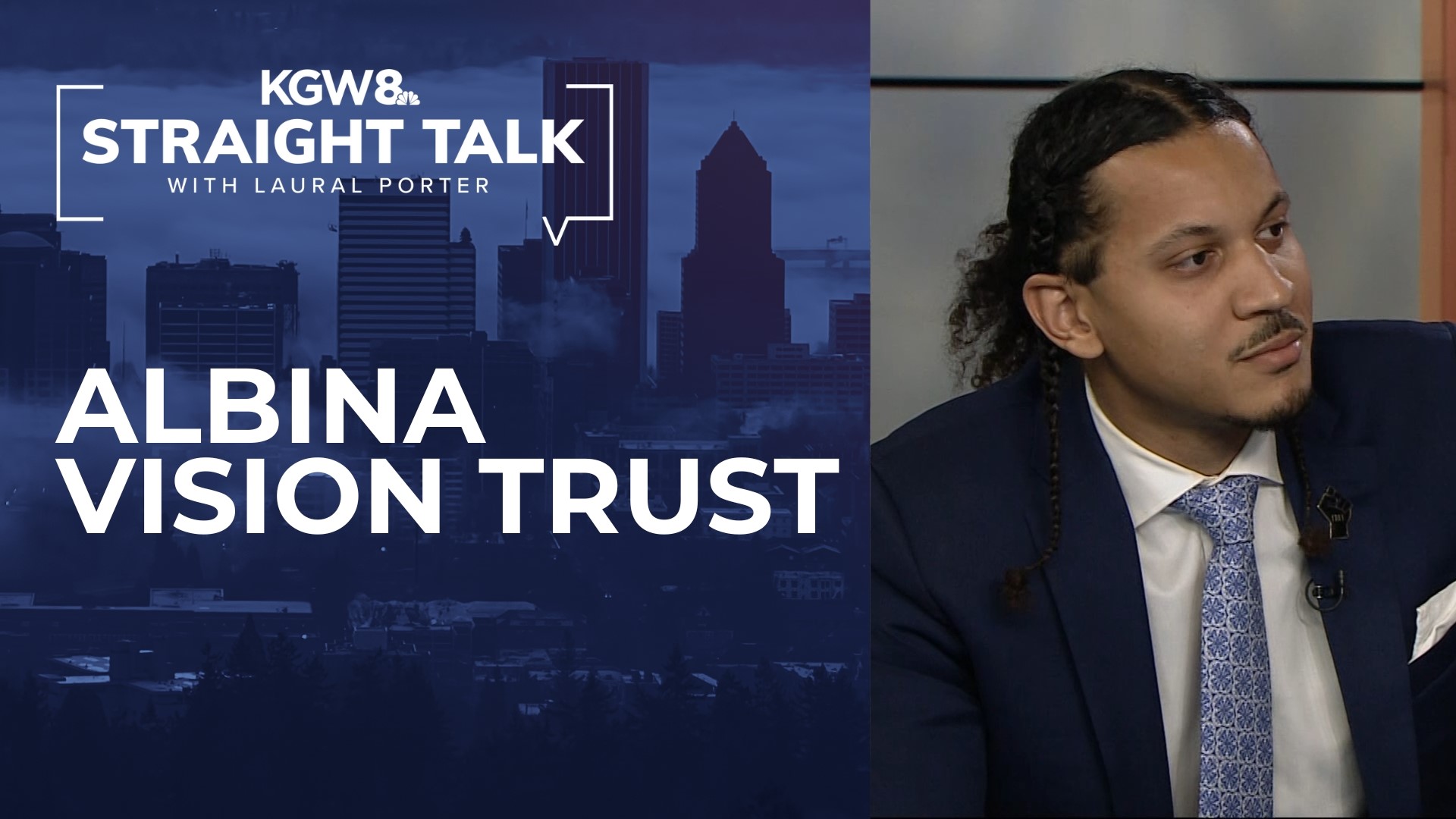PORTLAND, Ore. — Four out of five Black Portlanders once lived in Albina, a portion of inner Northeast Portland that includes the Elliot, Boise, King, Humboldt, Overlook, Irvington and Piedmont neighborhoods, but many of those residents were displaced by the construction of Interstate 5, during which Black-owned homes and business were destroyed through eminent domain and urban renewal policies.
Albina Vision Trust is a nonprofit that advocates for large-scale restorative development in the area, aiming to revitalize and reconnect the historically Black Albina community.
The nonprofit's executive director Winta Yohannes, board chair Michael Alexander and strategic communications lead JT Flowers were guests on this week's episode of Straight Talk to discuss the history of Albina, what Albina Vision Trust has accomplished so far, and the organization's vision and plans for the future.
"Our dream is to successfully execute that vision and create a brand-new neighborhood where wealth is shared and opportunity is available to all who live there," Yohannes said, adding that if successful, the scale of the project would result in the area adding a whole new ZIP code.
Impacts of gentrification, red-lining practices remain
Oregon has a history of racist laws; the state inserted an exclusion clause into its constitution in 1857 that barred Black people from moving to Oregon. It was repealed in 1926, but racist policies continued to be manifested through real estate practices in Portland, according to Karen Gibson, associate professor emeritus at PSU.
"Many folks don't recognize that in Portland, the homeownership gap between Black families and white families is actually the fourth-worst in the nation," Yohannes said. "And so that's the impact of decades of this kind of policy."
MORE FROM STRAIGHT TALK: Interstate Bridge tolling timeline takes shape with planned 2026 start
Black people were not only denied access to homes, she said, but in red-line neighborhoods, they were also denied access to insurance, business loans and other mechanisms to build wealth. That impact continued to be felt across generations of Black Portlanders, even as the city's overall population advanced and gained in wealth.
Gentrification and displacement have also had a horrendous effect in Portland and Albina, Alexander said, in some cases even worse than in other major American cities.
"I grew up in Brooklyn, New York, and I grew up in an area that has undergone tremendous gentrification, but I can point to the house that I was raised in, and my grandchildren can see that," he said. "That historical remnant is there, and we build stories and memories around that. There are hundreds of Black families that cannot do that here. They're pointing to I-5, they're pointing to the (Legacy Emanuel) hospital, they're pointing to the Memorial Coliseum."
That impact isn't just emotional and spiritual, he said — it's also financial, which is why the nonprofit pursues a vision that brings together both restorative justice and restorative economics.
Albina One's vision
The Trust's particular focus is on Lower Albina, a roughly 94-acre portion of the area that stretches from the Willamette River to I-5, between the streets leading to the Broadway and Steel Bridges, Flowers explained — the area now centered around the Moda Center and Veterans Memorial Coliseum.
But it's not just about geography, Yohannes added. The city is at a decision point whether it wants to be a place with "two classes of people, where only folks who can afford to live here are ones who have had access to generational wealth, and everybody else is essentially a service worker that is coming her to provide cultural and artistic talent, to work service jobs and, if they're fortunate, to live in affordable housing. We don't think that's acceptable."
The nonprofit recently celebrated the groundbreaking of Albina One in August, the first major project under the Albina Vision banner. The 94-unit affordable housing development is in the Eliot neighborhood. The project is the product of years of work and "intentional commitment to excellence," Yohannes said. The first families are expected to move in around the summer of 2025.
The damage to Albina happened over decades, Alexander said, so the nonprofit is trying to maintain a similarly long-term vision, but projects like Albina One provide an opportunity to visualize what that future can look like.
"Albina One allows us to both talk about aspiration and demonstration," he said. "This is the beginning. This is what fellow travelers into this space and this work have to look at being a part of — what we believe in, and what we want to demonstrate is possible, and quite frankly, is inevitable. We are going to continue to build on this path."
Straight Talk airs Friday at 7pm, Saturday and Sunday at 6:30pm. Straight Talk is also available as a podcast.

